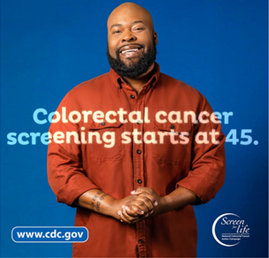
National Colorectal Cancer Awareness Month brings attention to the second leading cause of cancer deaths in the United States highlighting the importance of preventive colorectal cancer screenings. Colorectal cancer develops in the large intestine (colon) or the rectum, often beginning as noncancerous polyps. The Centers for Disease Control and Prevention (CDC)’s Screen for Life campaign encourages adults to screen for the disease because screening tests can find the cancer early and tests such as colonoscopies can remove benign and precancerous polyps before they cause trouble.
Due to the increase in colorectal cancer cases for adults younger than 55, the recommended beginning screening age is 45. While leading a healthy lifestyle may help prevent different types of cancers, screening tests to detect and remove polyps before they turn into cancer is the most effective way to reduce the risk of developing colon and rectal cancers.
Resources for Clinicians
- SN Video Medicine and Life Sciences. Laparoscopic Complete Mesocolic Excision for Right Colon Cancer. 2020 eVideo. This video shows how to perform laparoscopic complete mesocolic excision, with radical lymphadenectomy, in patients with right colon cancer.
- Colorectal Cancer—Health Professional Version. NIH National Cancer Institute’s information page.
- Colorectal Cancer Screening Continuing Education. CDC and Medscape Education’s course for primary care providers.
- Colorectal Cancers: From Present Problems to Future Solutions. 2022 eBook.
Articles
- Colorectal Cancer Diagnosed During Pregnancy: Systematic Review and Treatment Pathways. 2017 European Journal of Gastroenterology & Hepatology article.
- Surgical Outcomes and Survival Rates of Colon Cancer in Children and Young Adults. 2021 The American Journal of Surgery article. Colon cancer in children and young adults is rare. We sought to compare outcomes and survival between patients ≤and>25 years of age with colon cancer.
- Comparison of Oncological Outcomes of Right-Sided Colon Cancer Versus Left-Sided Colon Cancer after Curative Resection: Which Side is Better Outcome? 2017 Medicine article. There are embryological origins, anatomical, histological, genetic, and immunological differences between right-sided colon cancer (RCC) and left-sided colon cancer (LCC).
- Disparities Among Limited English Proficient Patients in Colon Cancer Screening with Multi-target DNA Stool Test. 2022 Journal of Immigrant and Minority Health article. Racial and language minority groups in the U.S. are at a higher risk for morbidity and mortality from colorectal cancer (CRC), partially due to lower screening rates.
- Colorectal Cancer 'Not An Old People's Disease Anymore'. (2024) UW Medicine Newsroom Noteworthy blog post. By 2030, the disease is projected to top the list of U.S. cancer deaths in this demographic.
Patient Education
- Colorectal Cancer—Patient Version. NIH National Cancer Institute’s information page.
- Colorectal Screening Procedures. UW Medicine Patient Video Library (2.53 min)
- What is a Colonoscopy? UW Medicine Patient Video Library (2.05 min)
- Childhood Obesity and Colon Cancer. 2017 NYTimes Video Collection
- EthnoMed Colorectal Cancer—For Patients. Collection of audio, PDF, and video on colorectal cancer in a variety of languages: Amharic, Cantonese, Chinese, English, Hmong, Khmer, Korean, Lao, Oromo, Somali, Spanish, Tagalog, Tigrinya, and Vietnamese. Can filter by cancer subtopic and language.